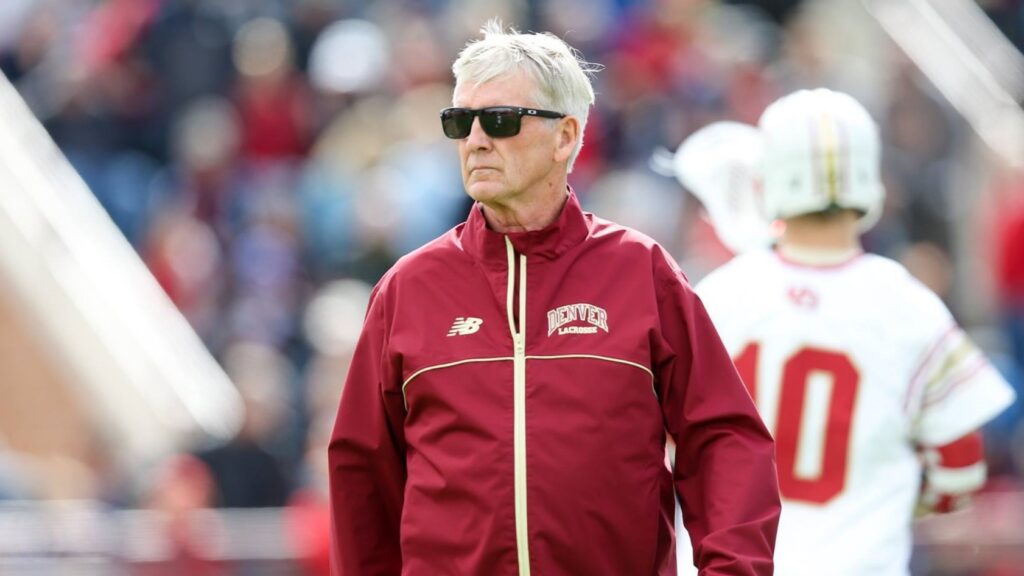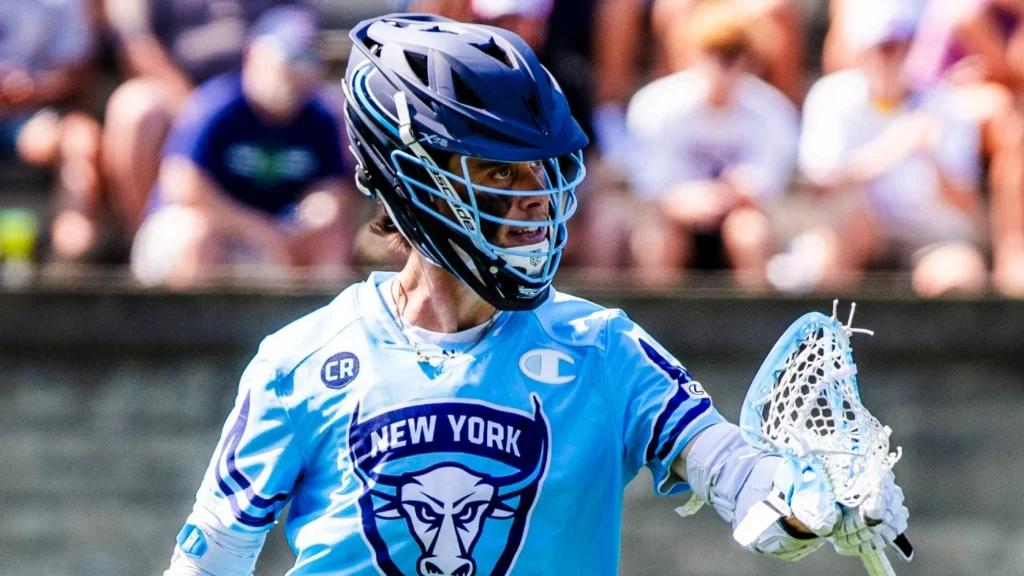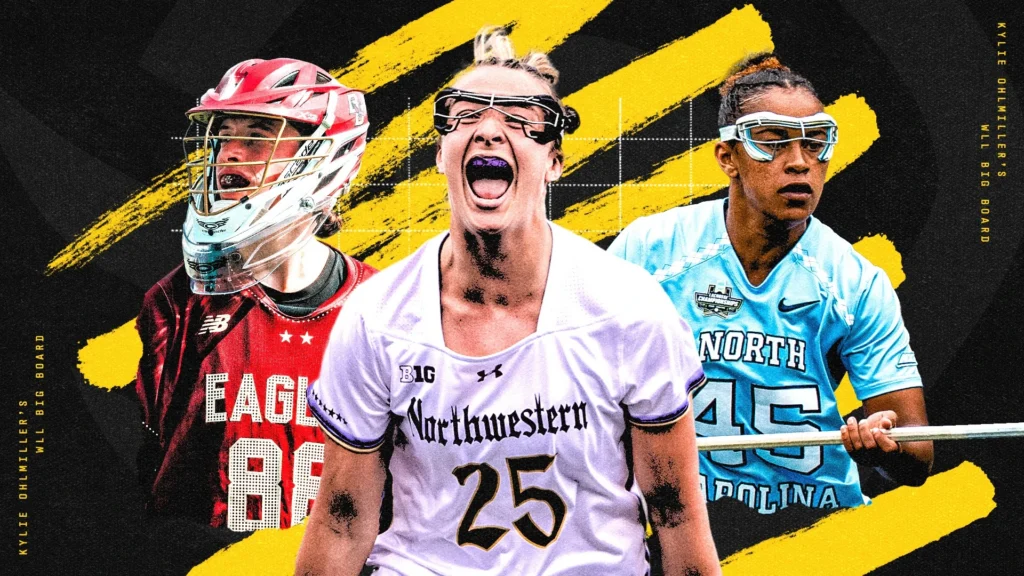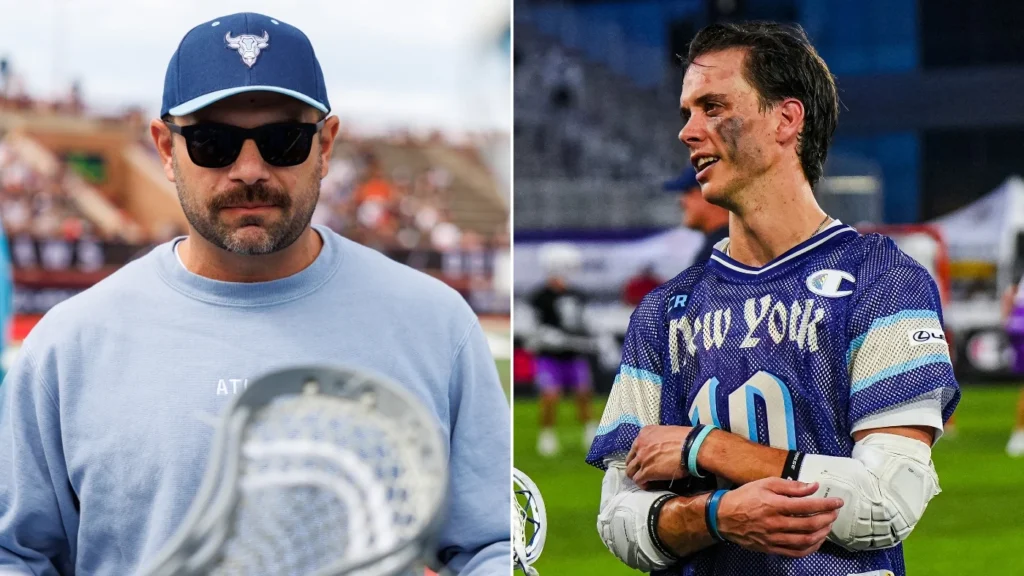
Bill Tierney: The Lacrosse Whisperer
By Wyatt Miller | Apr 12, 2024
Unbeknownst to head coach Bill Tierney, David Morrow quit the Princeton lacrosse team as a freshman in 1990.
“I was the worst player on the team,” Morrow said. “They’d be talking about a drill and I’d just be standing in the back of the line hoping to figure it out before my turn. After a month or so, I just said ‘F*** it, I’m not gonna go anymore.’”
The future founder of Warrior Lacrosse stopped showing up to practice, and resigned himself to working his way up from the junior varsity hockey team, as he was the top recruit in Michigan for both sports. After a week of hockey practice, he got a call from Tierney, and went to his office, where Morrow explained that he had arranged to switch sports because he was better at hockey.
At this point, Tierney got up, closed his office door, and let loose. He screamed at Morrow about loyalty, promising that if he quit then, he’d make a habit of it. Intimidation encouraged Morrow to stay, and he made a pact with himself: By senior year, he would be a starter.
But as a sophomore, Morrow started the first game, shutting down Johns Hopkins’ best attackman. From that point on, Tierney continuously convinced Morrow he could do anything. He found out what made Morrow tick – anger – and directed it in a way he knew the blue-collar Michigan kid would respond to. By the end of his senior season, Morrow was awarded national defenseman of the year twice and national player of the year in 1993. No other defenseman has won the award in the 31 years since.
“He was always trying to make me mad at the right spots,” Morrow said. “He would say things about what players would say about me in an interview, and it was all false. But back then you couldn’t check it, so I would get really upset. I played with a lot of emotion.”
Tierney is the lacrosse whisperer, because his capacity for optimizing individuals so they play perfectly in his system is unique. He understands how different human beings are motivated, and respects individuality. Tierney has a vision for everyone, and he works tirelessly to coax out the best version of each person in their respective roles. After 41 years in collegiate coaching, featuring seven national championships and two program rebuilds, Tierney is bringing that power to the pros as head coach and general manager of the Philadelphia Waterdogs.
Princeton: “Nobody had it better or worse than us”
When Tierney took over the Princeton program in 1988, the team had earned a sub-.500 record for four-straight years. It took a lot of time, sweat and swear words to change that, as the trend continued for two seasons under Tierney before they started winning.
Still, that didn’t stop him from promising his recruits, including Morrow, a national title. Morrow thought he was crazy. But three years later, in 1992, they hoisted the trophy, and Morrow was Tierney’s first home-grown star.
“He took a group of guys that weren’t as talented individually and convinced them, as a team, you can beat anybody,” Morrow said. “He would say that all the time, and he even told me that when he recruited me.”
While most of the top defenders played for takeaways, Morrow was the first true positional stopper. He was often the quickest player on the field, so Tierney told him to disregard everyone else and just stick to the other team’s top attackman. If he did that “nobody will run by you,” he’d say.
“He convinced me, if you stop the other team’s best player, we are going to win,” Morrow recalled. “I hated playing like that. I thought it was boring because it was easy. I was like ‘Coach, this is easy, you just want me to stand here and make sure the guy doesn’t score?’ And he goes, ‘Well, if you think it’s easy, that’s even better.’”
This strategy worked for Morrow in particular because his goal wasn’t to stop guys, it was to hurt them, he said. They worried about potential broken bones rather than where to go with the ball. Tierney used that blend of rage and speed to mold the first defenseman of his kind, one that would define a generation of Princeton defense.
“What he really gave me was the gift of self-confidence,” Morrow said. “And when you have self-confidence, you can accomplish anything. I never thought I’d be a good lacrosse player. I had very low expectations, and then he shot me so far beyond that.”
In addition to his on-field contributions, Morrow’s first Warrior invention, the titanium stick handle, was used by the team to win their first national title. Tierney poured over the rule book to ensure it was legal, eventually allowing the team to play with them in the tournament. If he’d let Morrow quit three years prior, who knows where he’d be now.
That 1992 season catapulted the Tigers to the top of the totem pole, as they would win five more national championships over the next eight seasons. The run cemented Tierney as one of the greatest coaches in lacrosse history, but he couldn’t have pulled off a three-peat without some offensive starpower to compliment his defensive genius. That arrived in the form of Jesse Hubbard in 1995, and was honed by longtime offensive coordinator David Metzbower.
Hubbard revered Tierney, having watched him completely flip the culture of the team during his brother’s tenure there. Over four seasons, Hubbard set the career goals record for the Tigers (165), one he still holds to this day. He’s considered one of the greatest college lacrosse players of all time, with three-straight national championships from 1996-98, but “great” wasn’t how he felt back then.
Everyone has a specific role in Tierney’s schemes, and Hubbard’s was to shoot and score goals. If he wasn’t doing that, Hubbard said Tierney got in his face and held him accountable. Yet, they weren’t the same motivational tactics he used on Morrow. Everything was lacrosse-based, not anger-based, for Hubbard. All he had to say was “man, you sucked today,” and a switch flipped. That direct communication made Hubbard hesitate at first, until he learned to read between the lines.
That’s just Tierney. Everyone needs to know what’s expected of them, and if they do it wrong, he’s going to let them know harshly. But that can’t deter people from playing their role, only doing it wrong. Once Hubbard realized that, everything clicked into place.
In practice, drills were about the details. Tierney screamed when players didn’t turn their hips all the way, slid a split-second too late or simply missed the cage – everything was about execution. Once he was satisfied with that in practice, he’d actually relax before games.
It may not have seemed that way given Tierney's famous turf-grabbing tirades against the referees, but he would bust out the shorts and a smile in the playoffs. He knew the real work was done in practice, and the rest was relatively out of his control.
No matter how tough their opponent was, no game was worse than practice, and that gave the team an odd sense of comfort.
“At the time, he seems possessed and he seems like he’s obsessing over these details that don’t matter, but they do matter, and that’s why he has so many championships,” Hubbard said. “Nobody had a scarier coach, nobody had a better coach, nobody had a coach that they were more prepared to play for, and it gives you an amazing sense of unspeakable confidence.”
Matt Striebel’s first time on Princeton’s campus was a perfect indication of the exhaustive environment he was about to enter. It was still early in the fall, and with the entire 1996 recruiting class on campus, Striebel expected to see an upbeat session and maybe some scrimmaging. When they arrived, Tierney was barking orders at his attackmen to execute a man-down clear.
Chris Massey, Hubbard and Jon Hess were forced to redo the drill at least three times before Tierney was satisfied. And it wasn’t like they were getting stopped every time, they just weren’t executing the drill at the level Tierney wanted.
“I remember walking out of that practice and thinking ‘I don’t care if I never step foot on the field here, this is where I want to go and this is what I want to be a part of,’” Striebel said.
Everyone knew what they were getting at Princeton – they were going to win, but it would cost them. People who excelled under that type of pressure were phenomenal for Tierney. People who didn’t, weren't.
“There was a sense around the players that nobody in the country had it worse or better than us,” Striebel said.
Eventually, Tierney started to play into that. In 2001, he often said, “I either want you to win with me or in spite of me.” At the time, Striebel said they didn’t fully understand what that meant, but now he does.
Striebel and a group of seniors used to play pickup basketball during the season, much to Tierney’s chagrin. He felt the resentment, but didn’t take it as an insult. It may have been risky, but he recognized that the group of seniors were unified by a mutual enmity for him, and he allowed them to use that advantageously.
Winning that tournament in 2001 was “a sigh of relief,” Striebel said, because of that dynamic.
Denver: “You have to look sharper”
After a heartbreaking loss to Syracuse in 2002, Tierney didn’t reach the finals for the rest of his Princeton tenure. In those seven years, he evolved with the times, and his demeanor lightened slightly. He left for Denver after the 2009 season, beginning another program rebuild. He wanted another challenge.
”People questioned either my sanity or place in life when I moved from Princeton to Denver,” Tierney said. “But there were other goals in mind when it came to the big picture of helping the game of lacrosse move west.”
The Pioneers had failed to make it past the first round of the NCAA playoffs in only two appearances before Tierney arrived. From 2010-2023, Tierney led Denver to 10 tournaments, including nine straight starting in 2010, four final fours and one championship in 2015.
Tierney always cared about his players off the field, but at Denver, he made a more pronounced mission to prepare his players for life after college. To do that, he had to embrace change because, as he says, “When you stop learning, you stop living, and I’m still learning.”
Nobody enabled that stylistic shift more than his offensive coordinator, Matt Brown. Tierney had never even coached a Canadian player before coming to DU, and Brown, being Canadian, opened his eyes to a new way of doing things. Now, a whole host of Canucks owe their success to Tierney, including Waterdogs attackman Ethan Walker.
“His goal has always been to educate and help these young kids going through that college life come out when they graduate and be men (who are) ready for the real world,” Walker said.
On flights, every player wore a suit and tie to-and-from games. Trevor Baptiste said he would sweat through his suit on most trips. And if someone showed up with a crumpled coat or scuffed up shoes, Walker said Tierney was always the first to say, “you have to look sharper.”
Walker never got that treatment, but said his longtime DU and Waterdogs teammate Jack Hannah was a “wild card,” and definitely got a few speeches on his shabbiness.
“You got 18-22 year old young men that are still really impressionable,” Tierney said. “If you get a young man who really wants, as an 18-year-old, to look the way he wants and act the way he wants and do what he wants, you’re not going to win.”
Tierney was beyond detailed in his approach to everything. They had to be clean-shaven. The team would practice in jerseys, with pinnies on top, to recreate the feeling of the shirts they played games in. Baptiste said the seniors would tell him things as seemingly insignificant as when to wear a certain pair of sweats. Everyone had to match, but Tierney had a method to the madness, even for the small things like sweatpants. It was all about being professional and unified, to prepare for the real world.
“There was just a narrative that we’re going to do a little bit more,” Baptiste said. “The preparation is going to be very hard, so the game is going to be easy. That’s what he was always all about, and it paid off.”
Tierney didn’t change his spots too much, though, as his brutal training regimen continued. The Monday mile became a staple of his notoriously ruthless practice routine at DU. Yet, his ability to shape individuals to play a cog in the team’s machine became even more acute.
Baptiste had zero Division I offers entering his senior year, but his problems were all mental, and that’s something Tierney could change. As a younger athlete, every faceoff loss left a bad taste in his mouth. It affected his post-clamp play as well as the ensuing faceoff. Tierney found a way to help him progress into the best faceoff man in Denver history, currently holding the record for faceoff win percentage (71.4%) and wins (1,158) by wide margins.
“He knew how much I cared and how hard on myself I was,” Baptiste said. “He would say, ‘When you’re out there, I want you to think of yourself more as a quarterback or a kicker, in the fact that you can’t let your emotions get to you… You want to be even-keeled, assess the situation and execute.’”
Baptiste won the starting faceoff job as a rookie in 2015, helping Tierney win his first national championship in red and gold. And after the mountain had been climbed, Tierney didn’t claim any credit – it was the players’ achievement.
“He was like, ‘You guys did it,’ like ‘I’m so proud of you guys,’” Baptiste recalled. “In the moment, you’re like, ‘Of course,’ but looking back on it, to hear that, it wasn’t about him at all, and that’s how he made it.”
The year Baptiste graduated was Hannah’s freshman year. So, Tierney traded the best faceoff man he’d ever had for the most competitive player he’d seen in 50 years of coaching, he said. Hannah’s a very emotional player – his highs and lows swing further on the pendulum than most.
“That can be his strength and it can also be his downfall sometimes,” Tierney said of Hannah’s competitive nature.
Tierney gave him ways to center himself on the field, so his emotion is a help instead of a hindrance.
“I’m glad Coach T is someone who appreciates that competitiveness and helps me use it in a positive manner all the time,” Hannah said.
After two-straight Tewaaraton Award nominations, Walker was one of the best players in the country as a senior in 2020. He and Hannah were also best friends, but the junior was struggling to get out of his head, despite explosive potential from the midfield. Before one of their first games of the shortened season, Tierney pulled Walker aside and asked him to talk to Hannah before the game and try to level him out.
The always-even-keeled Walker went over and conveyed a simple message: “Let’s go, let’s get this one, let’s have some fun.” Then they dapped each other up, shared a hug and walked out onto the field.
Hannah led the team with 27 points through six games before the season was canceled due to the COVID-19 Pandemic, and the tradition stuck. To this day, Hannah and Walker still do that pregame ritual with the Waterdogs, and now Tierney will be back on the sidelines for it. The funny thing is, Walker never even told Hannah the ritual spawned from Tierney’s idea.
Waterdogs: A moderator
Before Tierney took the Waterdogs job, he had to make sure it was a team he’d enjoy coaching. To do that, he needed to know details on each player, so he could foresee his ability to motivate them. Naturally, he went to Hannah and Walker, having extensive conversations with both to find out the nature of each individual.
“(Walker and Hannah) know what I’m like and what I think is important,” Tierney said. “And they both expressed the culture around the team, guys being unselfish, guys caring about winning, guys caring about each other, all those good things were really prevalent in this group.
“They just knew it was a lot like our team at Denver. The guys are great and would buy into however we went about our business, so that was… what really made it a positive for me.”
Tierney knows he can’t coach college and professional players the same. He plans to be more of a moderator than a drill sergeant, helping guide the team forward, on and off the field.
Thus, in his first meeting with the team, Tierney conveyed that the most important thing to him in this new coaching endeavor will be trust. And if his players have beards, long hair or a t-shirt on, so be it, that’s their right as professionals, so long as they aren’t “slobs,” and he makes the final decisions.
“They’ve got to trust me,” Tierney said. “In this league, there are times when the offense gets together and there are 12 voices all saying something different. You can’t have that. It’s just trust that we’ll take information from them, share information, take their ideas and thoughts… They need to trust in me and my staff to make the final decision, to guide them in the right direction.”
That’s exactly what Copelan did over his five years coaching the Waterdogs – he took everyone’s perspective in, and the players trusted him to put them in a position to succeed. It seems like Tierney will continue on that path, with a slightly different approach to motivation.
“Coach T is going to come in and finish what Cope started,” Walker said. “He’s not going to come in and try to change the culture… He’s going to come in and retain the success that we’ve had over the last couple years.”




